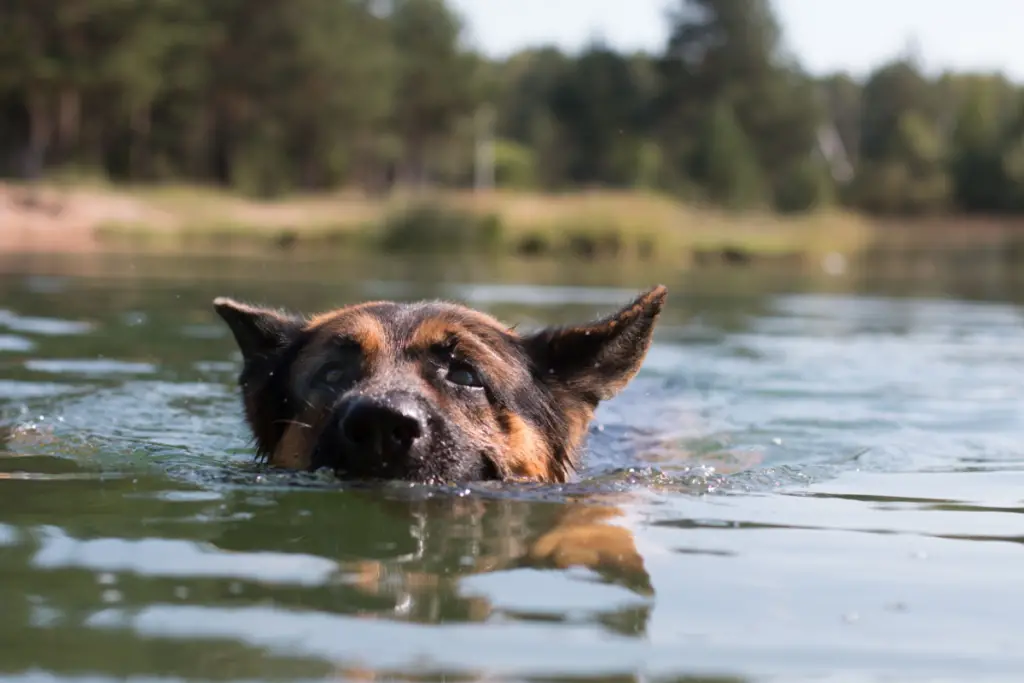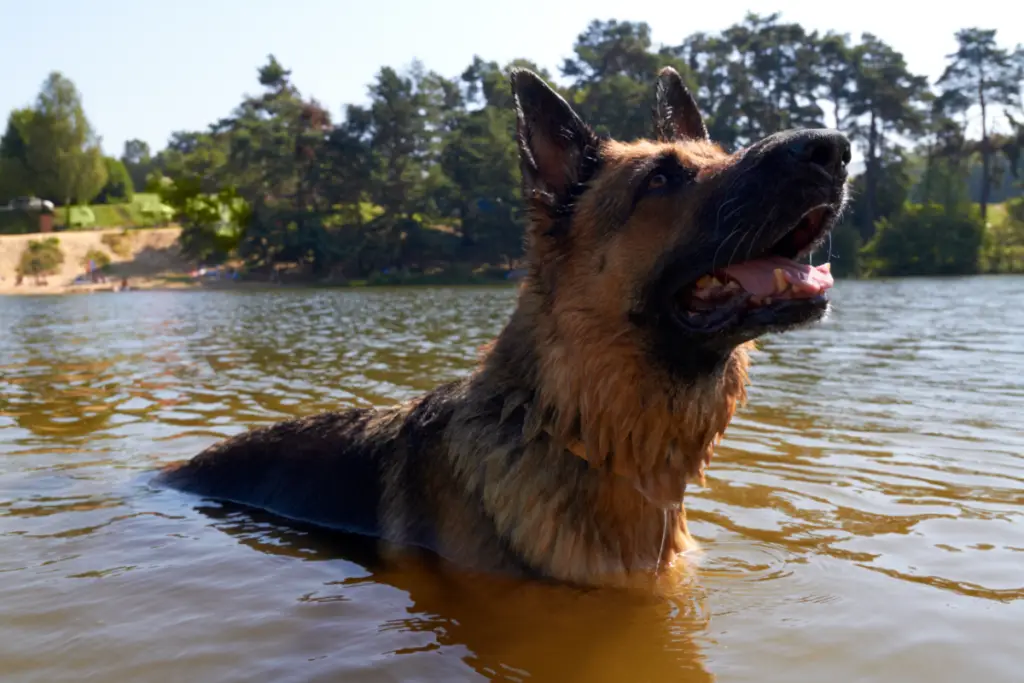German Shepherds enjoy swimming exercises to maintain their athletic form. Nevertheless, you may be going on a lake trip with your buddy and want to know, “Can German Shepherds get swimmer’s itch?”
Generally speaking, dogs, like humans, can contract swimmer’s itch from parasites in the water. Whether your German Shepherd is swimming or wading through the water, they could be at risk if the water is parasite-infested.
Stick around to learn more about how your German Shepherd can get swimmer’s itch.

Defining Swimmer’s Itch
Before getting into how swimmer’s itch could affect your German Shepherd, it may be helpful to gain a bit of understanding of the condition first. Swimmer’s itch, also referred to as cercarial dermatitis, is a skin rash caused by parasites in freshwater lakes, ponds, or even salt water.
The parasites originate from animals already living near the water areas such as ducks, beavers, and geese. Although these waterfowl aren’t affected by the parasites, humans and dogs can develop an allergic reaction from them.
That being so, the parasites are usually identified as Heterobilharzia Americana or a freshwater flatworm parasite. Another form of parasite named Schistosoma may also latch on to your dog.
Before these organisms decide to take host on your large warm-blooded pet, they usually latch on to water snails beforehand. Additionally, these parasites are usually active during the summer months.
How German Shepherds are at Risk of Swimmer’s Itch
German Shepherds, like any other dogs, can potentially develop swimmer’s itch. On the downside, the parasites find your Shepherd’s skin more welcoming than your own. For this reason, swimmer’s itch can become a more serious condition for dogs than humans.
In humans, the parasites usually die off within a few days of latching on the skin. As for canines, the parasites can breed and grow their numbers beneath the furry coat.
More specifically, the larvae parasite sticks its head in the dog’s skin and moves toward the lungs. Afterward, through the veins, it finds its way to your German Shepherd’s abdominal organs.
Once it reaches the organ area, it grows into its flatworm form and lays its eggs. Now, a portion of these eggs exit through the intestinal wall and are found in your dog’s feces. The remaining group of eggs travels to other organs, primarily the liver.
This, in turn, may cause serious damage to your four-legged friend’s internal health. Luckily, these parasites aren’t contagious to you or other pets unless they were swimming or wading in the same water.
Signs that Your German Shepherd has Swimmer’s Itch
If you recently went out on a swim near a lake or pond and notice your dog itching more than usual, then it could be a sign of swimmer’s itch. Once you part the German Shepherd’s medium-hair coat, you may notice lesions, rashes, red bumps, and sores.
Now, in some cases, the parasites can internally affect the dog and cause other complications. Some of these include diarrhea, vomiting, and, in more severe cases, liver failure.
Other symptoms that may affect your German Shepherd are:
- Weight loss
- Loss of appetite
- Bloody diarrhea
- Lots of drinking and urination
- Anemia
- Drooling
- Fatigue
To properly diagnose the Shepherd, you’ll need to take it to the vet for a fecal test. The examination will allow you to identify any parasitic infection in your dog’s body. Make sure to inform your vet that the dog was exposed to water as well.
Besides that, blood tests may not indicate a swimmer’s itch parasitic infection. Regardless of this, the blood work could show a general increase in your dog’s calcium and protein levels.
Humans vs. Dogs: Swimmer’s Itch Symptoms
Since humans aren’t as heavily affected as dogs with summer’s itch, the symptoms won’t be as serious.
Nevertheless, the initial effects of the parasite are similar where both humans and dogs experience skin lesions and rashes. Luckily for humans, the parasites won’t likely internally affect their organs.

Swimmer’s Itch Treatment for Your German Shepherd
Once you get your German Shepherd diagnosed with summer’s itch, the vet will likely prescribe deworming medication. This can include, praziquantel or fenbendazole.
In line with this medication, you can also add apple cider vinegar to your dog’s water bowl. Additionally, try adding one teaspoon or tablespoon of food-grade diatomaceous earth to your dog’s feeding bowl every day.
If your German Shepherd’s skin is highly inflamed from the parasitic infection, you can alleviate it with an oatmeal bath. It’s ideal for itchy skin. All you have to do is fill the bathtub with oats and warm water. Alternatively, you can use oatmeal dog shampoo.
The treatment can vary in how long it’ll last, depending on the severity of the dog’s case. The good news is that most dogs fully recover from swimmer’s itch.
Swimmer’s Itch Prevention for Your German Shepherd
The best way to prevent swimmer’s itch is to avoid the area where the parasites grow. This includes canals, lakes, swamps, and ponds.
You may also want to particularly avoid mushy areas, where water snails likely reside. Snails are probable carriers of the parasite. In addition to this, try not to bring food that may attract waterfowl like ducks since they’re also carriers.
Alternatively, to lessen the risk of swimmer’s itch, you can immediately towel dry your German Shepherd once they come out of the water. The parasite larvae don’t usually penetrate through the dog’s skin until it’s dried up.
Conclusion
Can German Shepherds get swimmer’s itch? Simply put, yes, your German Shepherd can develop swimmer’s itch. If they go splashing in parasite-infested waters, they’ll likely get this condition.
Swimmer’s itch in dogs is much worse than for humans since the parasites internally affect the dog’s health. For instance, the parasites can damage the liver or cause vomiting and diarrhea. To identify swimmer’s itch in your pet, consult a vet and they’ll ask you for a fecal test.
Once your buddy’s diagnosed, you’ll be given deworming products and your German Shepherd will be back in good shape.
